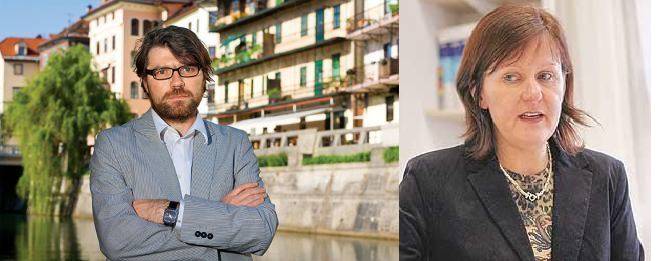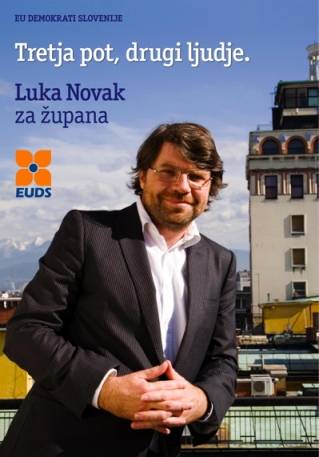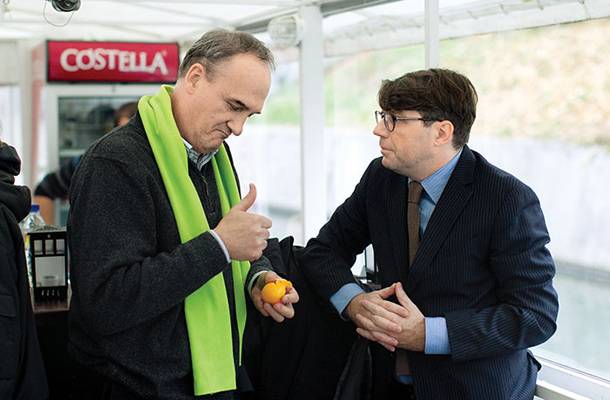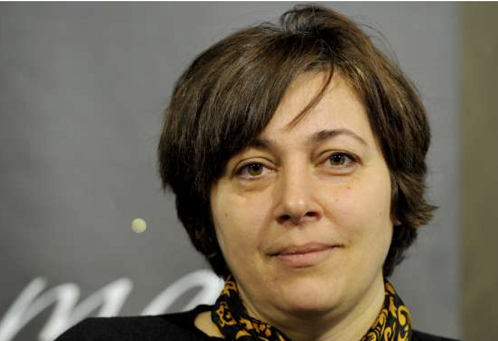

The Slovenian representatives in June 2013: URSIL Director Luka Novak and his deputy Helena Zalaznik.
Slovenia is probably the most well-developed and prosperous of the successor states of the former Federal Republic of Yugoslavia. Although the country straddles the Balkan Peninsula, most Slovenians prefer to consider it as part of "Central Europe". In fact, they are likely to object to their homeland being referred to as a "Balkan state" due to the negative associations which this term evokes.
"...they are likely to object to their homeland being referred to as a "Balkan state" due to the negative associations which this term evokes."Back in June 2013, the Slovenian delegation on the EPO's Administrative Council was headed by Luka Novak, the Director of the Intellectual Property Office of the Republic of Slovenia (known locally as the "URSIL").
Novak was not present in Munich for the 136th Council meeting. The acting head of delegation on that occasion was his deputy, Helena Zalaznik, the long-serving head of URSIL's patent department.
As far as can be determined, like his colleague Mihály Ficsor from the Hungarian IPO, Novak was off on a WIPO jolly in Marrakech for signing a "Treaty to Facilitate Access to Published Works for Persons Who Are Visually Impaired or Otherwise Print Disabled".
However, unlike Ficsor, Novak at least managed to ensure that his deputy Zalaznik was properly instructed to refrain from endorsing Battistelli's "Strike Regulations".
Novak was initially appointed as "acting director" of the URSIL on an ad interim basis in July 2012 and his appointment was confirmed in October 2012.
Prior to his appointment Novak enjoyed a kind of minor celebrity status in Slovenia as an author, publisher and "TV personality".
"Novak is also known in Slovenia and France as the author of various books, including works of fiction and non-fiction on diverse topics."He was born in 1963, to Andrej and Edvina Novak. His father Andrej was a journalist and later Slovenia's representative to the Council of Europe, and his mother Edvina founded the publishing company Vale-Novak in 1990.
Novak spent his childhood in Ljubljana and Paris, where his father was a foreign correspondent for the Slovenian newspaper Delo. He graduated from the Faculty of Arts of Ljubljiana University in 1987 with a degree in Comparative Literature and pursued post-graduate studies in Paris, Cologne and Tübingen.
After returning to Ljubljana in 1993, he took over the management of his mother's publishing company Vale-Novak and also set up his own company Totaliteta Publishers.
Novak is also known in Slovenia and France as the author of various books, including works of fiction and non-fiction on diverse topics.
"Novak also enjoyed fame in Slovenia as a "TV personality"."For example, Le Métro, Inconscient urbain is described as "a psychogeographical analysis of public transport in Paris, New York and Tokyo" and Phénoménologie de la mayonnaise is "a historical, anthropological and philosophical analysis of gastronomy".
He has also authored novels such as The Golden Shower, or What Men Want and The Feeling of Spring in Litzirüti.

Novak is known as a publisher and the author of various books, both fiction and non-fiction.
"Together with his wife Valentina Smej, he has co-written and co-hosted 120 episodes of gastronomical and lifestyle TV shows for various TV channels."During this phase of his career he was Slovenia's answer to Jamie Oliver and his cookery show Love through the stomach led to the publication of several best-selling cookbooks.
He was also involved in a major TV documentary series called 50€ Books That Shaped Slovenia. The series depicted and assessed the role of the most important literary works that contributed to the development and formation of Slovenia as a nation.

Slovenia's answer to Jamie Oliver: Novak co-hosted the show "Love through the stomach" with his wife Valentina.

In 2006 Novak made an unsuccessful bid to become mayor of Ljubljana on the Eurosceptic EUDS ticket.
"In 2006 he made an unsuccessful attempt to get elected as mayor of Ljubljana on the Eurosceptic EUDS ticket."Following the election, the SLS became a junior partner in the coalition government formed under the leadership of Janez Janša. It is likely that Novak's connections to the SLS helped him to secure the position as head of the URSIL following the dismissal of Jurij Žurej in May 2012.

Novak (r.) with Janez Podobnik (I.) of the centre-right SLS.
"We shall look at the circumstances of Novak's dismissal in more detail in the next part."During her time on the EPO's Administrative Council, StankoviÃÂ JuriÃÂiÃÂ took a stubbornly independent line and was openly critical of Battistelli.
As a matter of fact, a leaked recording from a meeting of the EPO's Budget and Finance Committee in 2014 shows that she was not afraid to openly challenge "Il Capo" and call him out on the dubious "human resources" policy which was being promoted by his management team:
At the beginning,” tells us one who listened to the recording, “one can hear an intervention of the Slovenian delegation. It says that the EPO is not a company on the stock exchange and should focus on quality and careful handling of human resources. Battistelli insults and threatens the delegation.
Then, Battistelli says that the [reform of the] career system will make “hundreds of millions for the office” and that “the Office should not care about FR, UK and DE law” but rather think only in terms of “what is good for the office”.”

Vesna Stanković JuriÃÂić openly challenged Battistelli on his dubious "human resources" policy but did not last long at the head of the Slovenian URSIL.
"At the time it was rumoured among EPO insiders that StankoviÃÂ JuriÃÂiÃÂ had been replaced at the request of Battistelli who was reputed to have flown to Ljubljana to complain to her supervising minister."That story can be found in local Slovenian media reports which reveal details of the local political intrigues that led to "constant changes" in the leadership of the URSIL between 2012 and 2015.
More specifically, these media reports explain the nefarious influence exerted over the Slovenian "IP" office by certain collective management organisations (CMOs) and their lobby groups.
In the next part we will investigate these matters in more detail and see how the Slovenian IPO became "a hostage to disputes over millions". (Local copy with translation [PDF]) ⬆